Abstract
Several alternatives to conventional ventilation in acute lung injury are now available and have been investigated to a varying degree. The assessment of all such techniques is limited by difficulties in designing proper comparative studies and by the time needed to recruit a large number of appropriate patients with acute lung injury. A common theme of lung volume maintenance combined with strategies designed to limit the extent of ventilator induced lung damage has emerged and should encourage reassessment of the conventional approach. The results of several large prospective comparative studies are eagerly awaited. Meanwhile we may reasonably suggest that improvements in respiratory support, together with advances in microbiological and pharmacological treatment, have the potential for improving the persistently disappointing survival rate in acute lung injury.
Full text
PDF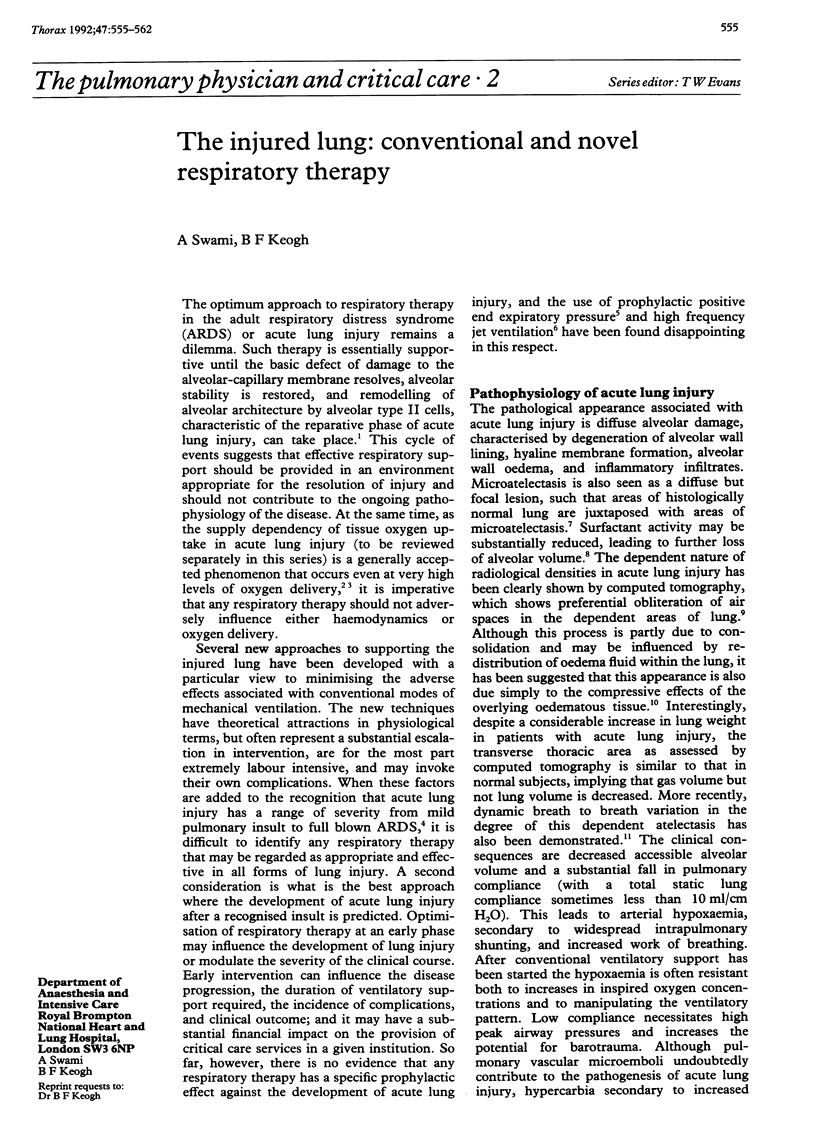
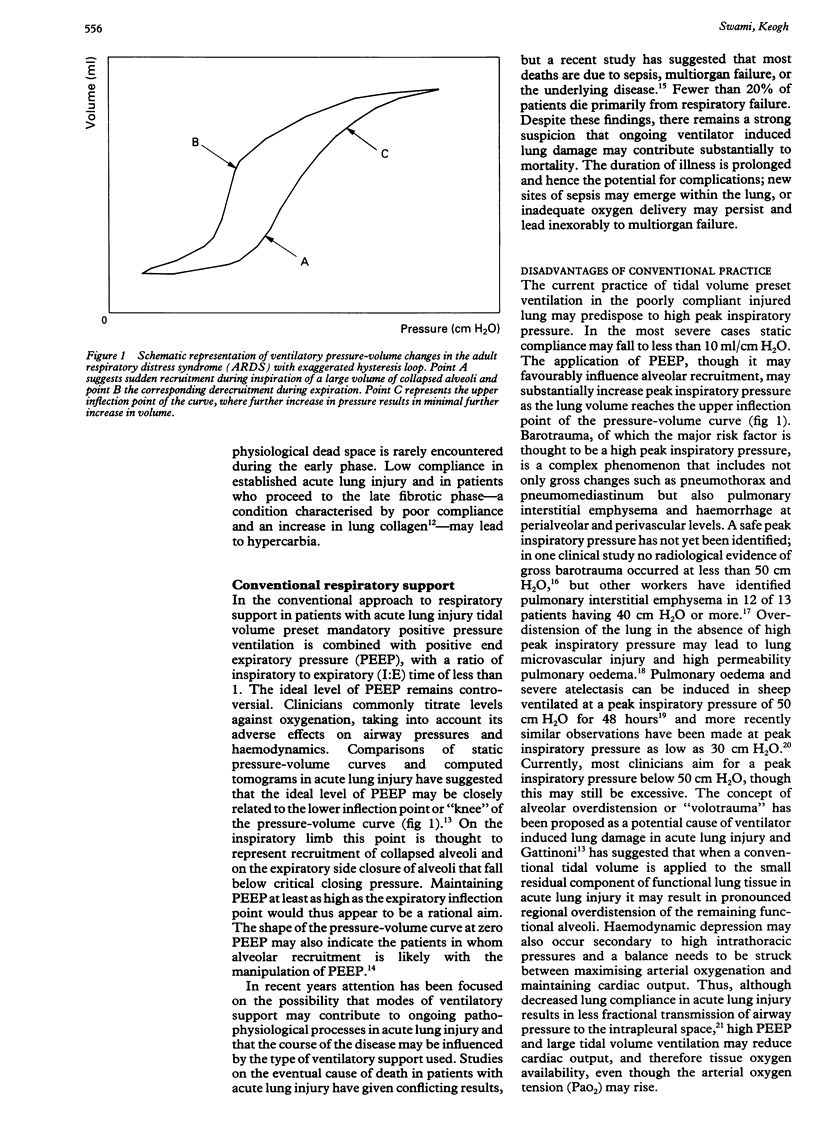
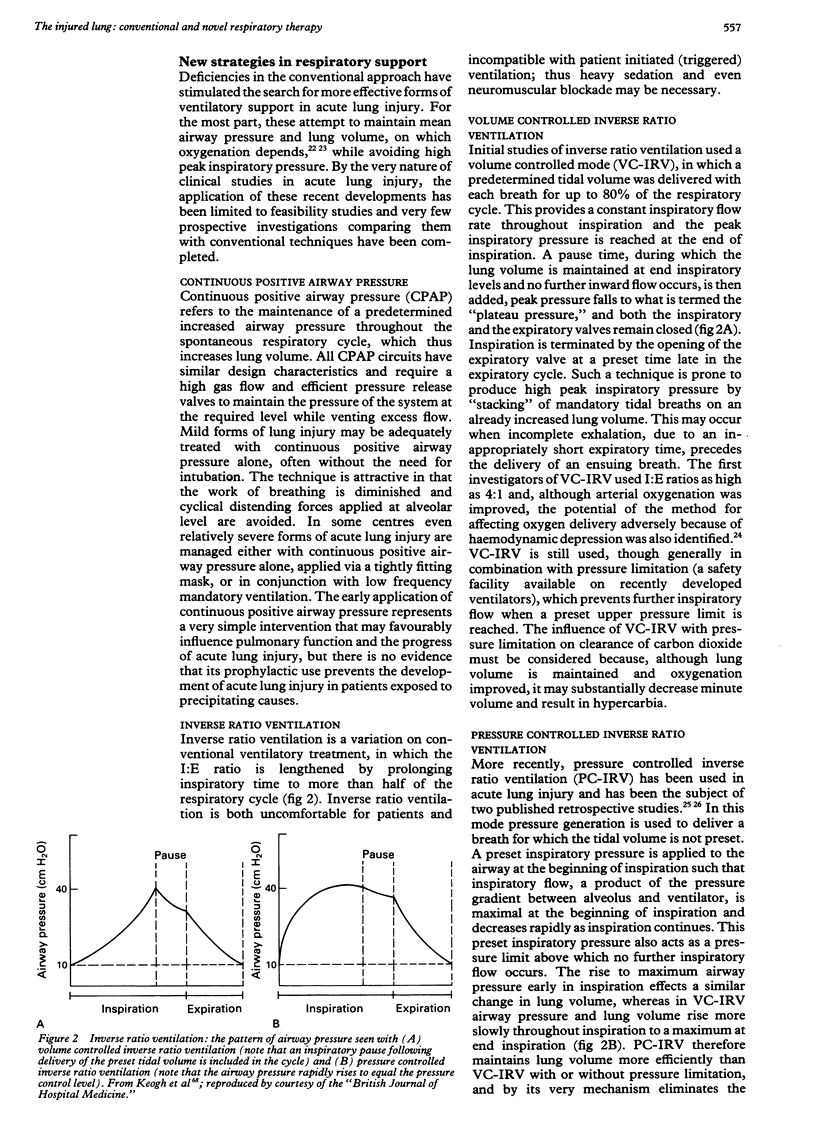
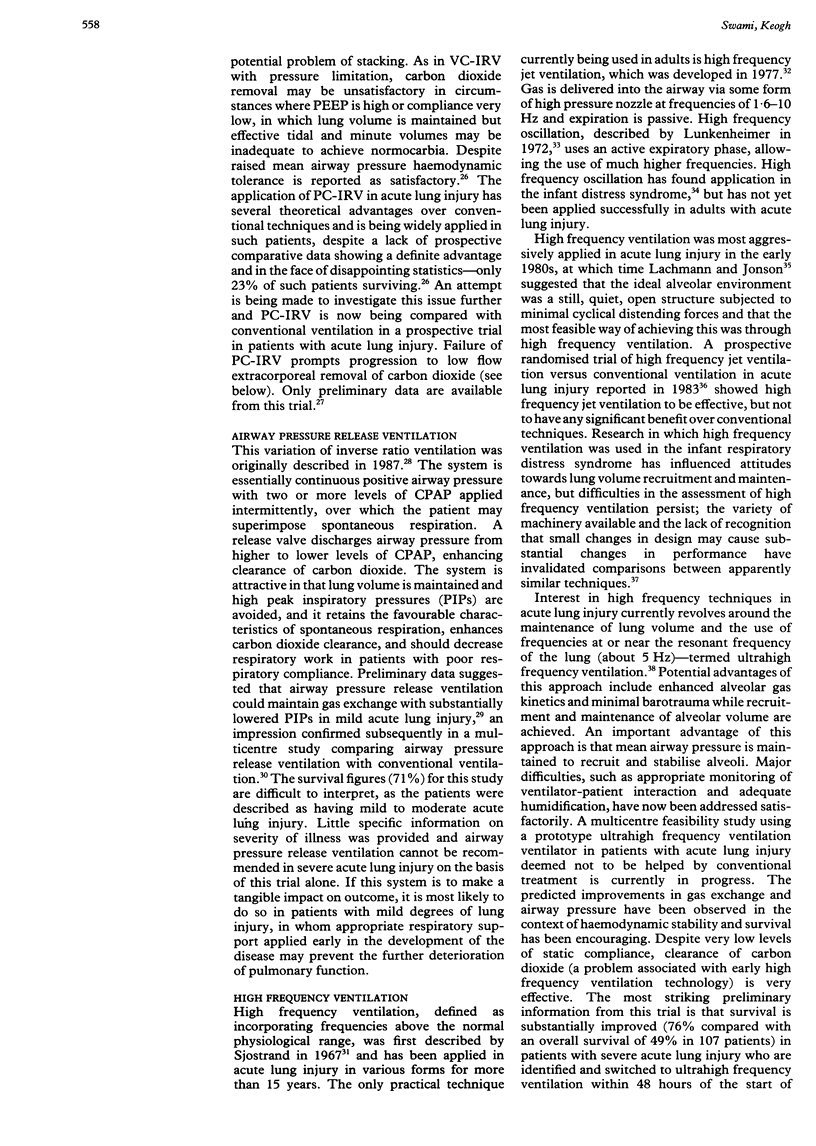
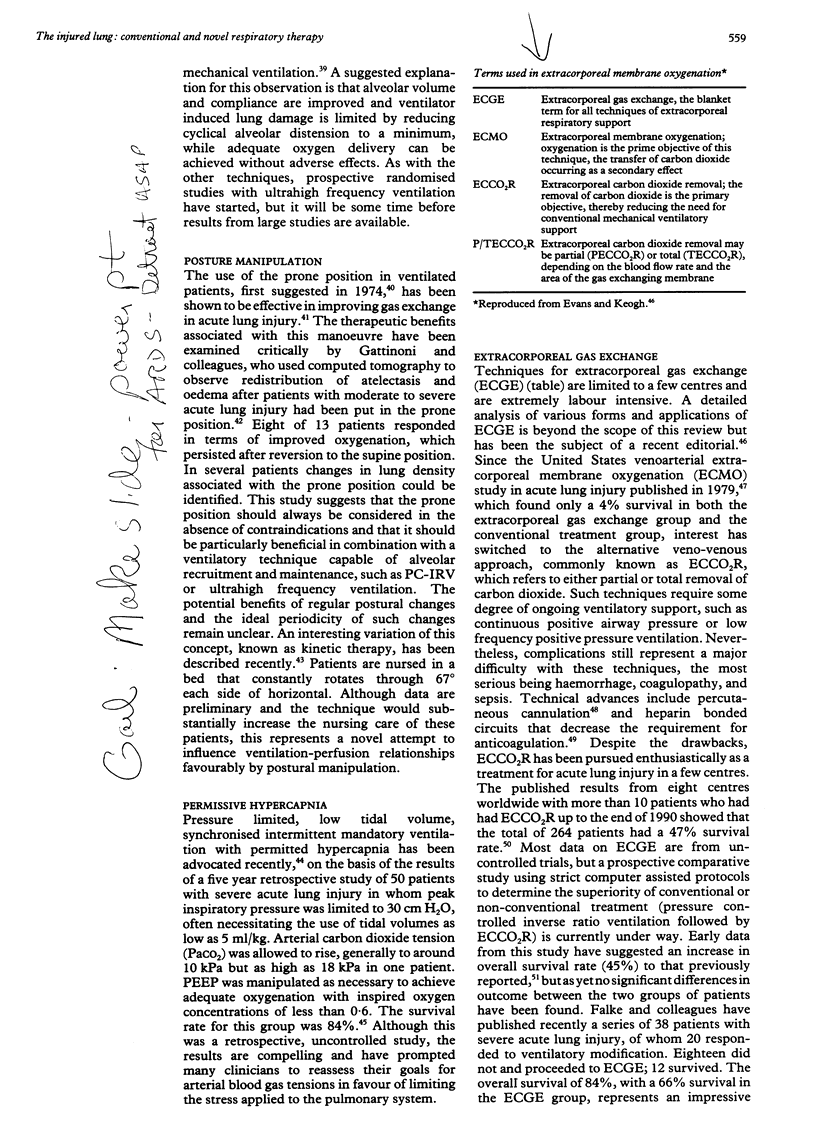
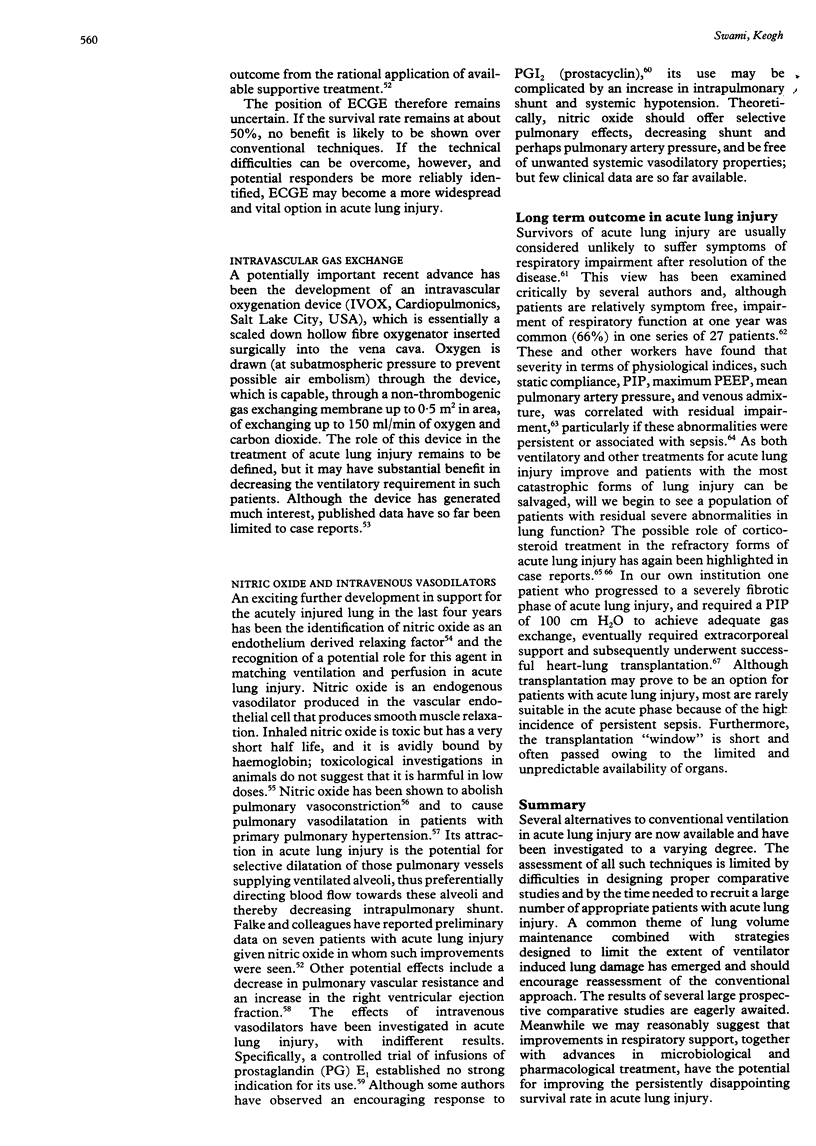
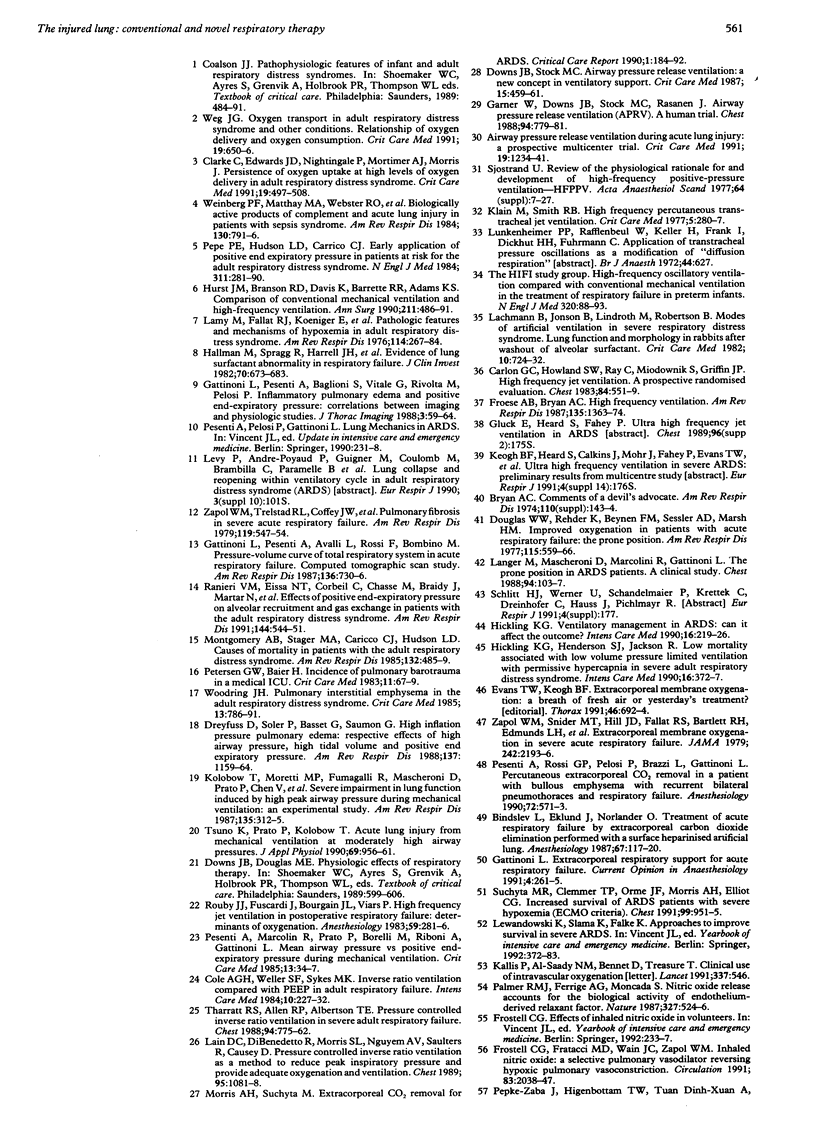
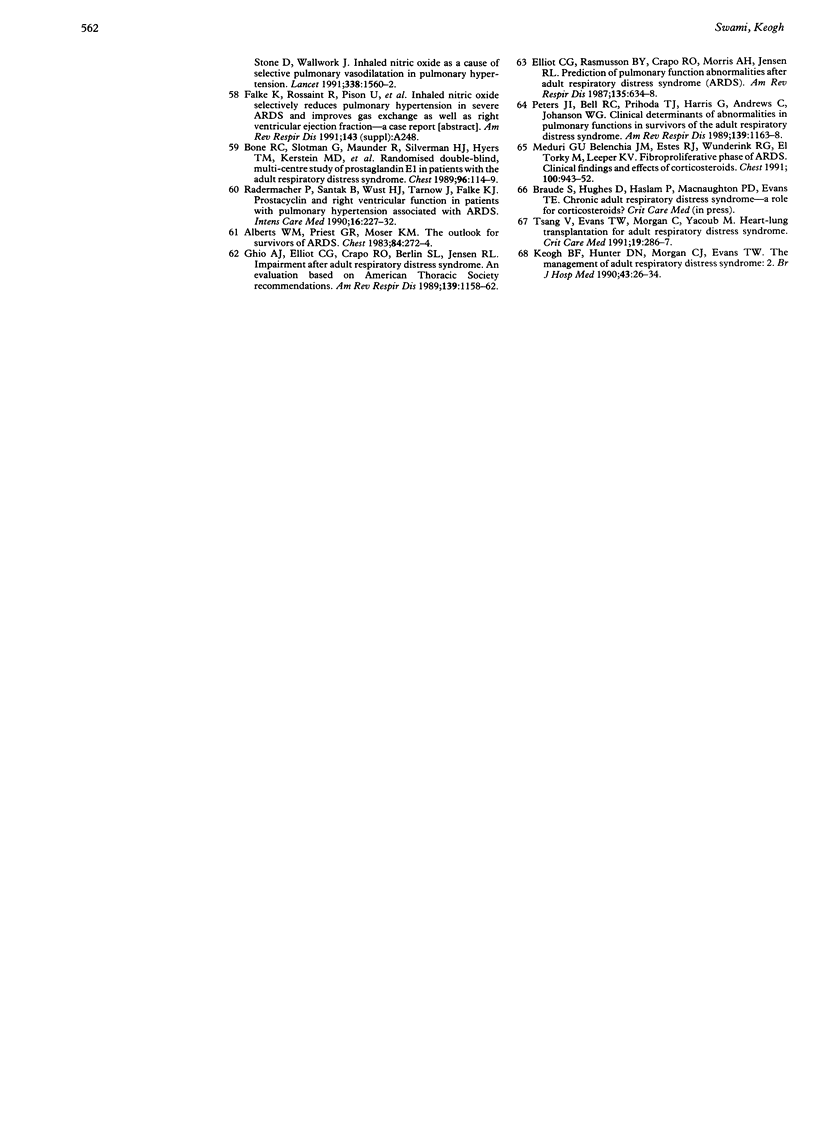
Selected References
These references are in PubMed. This may not be the complete list of references from this article.
- Alberts W. M., Priest G. R., Moser K. M. The outlook for survivors of ARDS. Chest. 1983 Sep;84(3):272–274. doi: 10.1378/chest.84.3.272. [DOI] [PubMed] [Google Scholar]
- Bindslev L., Eklund J., Norlander O., Swedenborg J., Olsson P., Nilsson E., Larm O., Gouda I., Malmberg A., Scholander E. Treatment of acute respiratory failure by extracorporeal carbon dioxide elimination performed with a surface heparinized artificial lung. Anesthesiology. 1987 Jul;67(1):117–120. doi: 10.1097/00000542-198707000-00024. [DOI] [PubMed] [Google Scholar]
- Bone R. C., Slotman G., Maunder R., Silverman H., Hyers T. M., Kerstein M. D., Ursprung J. J. Randomized double-blind, multicenter study of prostaglandin E1 in patients with the adult respiratory distress syndrome. Prostaglandin E1 Study Group. Chest. 1989 Jul;96(1):114–119. doi: 10.1378/chest.96.1.114. [DOI] [PubMed] [Google Scholar]
- Bryan A. C. Conference on the scientific basis of respiratory therapy. Pulmonary physiotherapy in the pediatric age group. Comments of a devil's advocate. Am Rev Respir Dis. 1974 Dec;110(6 Pt 2):143–144. doi: 10.1164/arrd.1974.110.6P2.143. [DOI] [PubMed] [Google Scholar]
- Carlon G. C., Howland W. S., Ray C., Miodownik S., Griffin J. P., Groeger J. S. High-frequency jet ventilation. A prospective randomized evaluation. Chest. 1983 Nov;84(5):551–559. doi: 10.1378/chest.84.5.551. [DOI] [PubMed] [Google Scholar]
- Cazin M., Paluszezak D., Bianchi A., Cazin J. C., Aerts C., Voisin C. Effects of anaerobiosis upon morphology and energy metabolism of alveolar macrophages cultured in gas phase. Eur Respir J. 1990 Oct;3(9):1015–1022. [PubMed] [Google Scholar]
- Clarke C., Edwards J. D., Nightingale P., Mortimer A. J., Morris J. Persistence of supply dependency of oxygen uptake at high levels of delivery in adult respiratory distress syndrome. Crit Care Med. 1991 Apr;19(4):497–502. doi: 10.1097/00003246-199104000-00007. [DOI] [PubMed] [Google Scholar]
- Cole A. G., Weller S. F., Sykes M. K. Inverse ratio ventilation compared with PEEP in adult respiratory failure. Intensive Care Med. 1984;10(5):227–232. doi: 10.1007/BF00256258. [DOI] [PubMed] [Google Scholar]
- Douglas W. W., Rehder K., Beynen F. M., Sessler A. D., Marsh H. M. Improved oxygenation in patients with acute respiratory failure: the prone position. Am Rev Respir Dis. 1977 Apr;115(4):559–566. doi: 10.1164/arrd.1977.115.4.559. [DOI] [PubMed] [Google Scholar]
- Downs J. B., Stock M. C. Airway pressure release ventilation: a new concept in ventilatory support. Crit Care Med. 1987 May;15(5):459–461. [PubMed] [Google Scholar]
- Dreyfuss D., Soler P., Basset G., Saumon G. High inflation pressure pulmonary edema. Respective effects of high airway pressure, high tidal volume, and positive end-expiratory pressure. Am Rev Respir Dis. 1988 May;137(5):1159–1164. doi: 10.1164/ajrccm/137.5.1159. [DOI] [PubMed] [Google Scholar]
- Elliott C. G., Rasmusson B. Y., Crapo R. O., Morris A. H., Jensen R. L. Prediction of pulmonary function abnormalities after adult respiratory distress syndrome (ARDS). Am Rev Respir Dis. 1987 Mar;135(3):634–638. doi: 10.1164/arrd.1987.135.3.634. [DOI] [PubMed] [Google Scholar]
- Evans T. W., Keogh B. F. Extracorporeal membrane oxygenation: a breath of fresh air or yesterday's treatment? Thorax. 1991 Oct;46(10):692–694. doi: 10.1136/thx.46.10.692. [DOI] [PMC free article] [PubMed] [Google Scholar]
- Froese A. B., Bryan A. C. High frequency ventilation. Am Rev Respir Dis. 1987 Jun;135(6):1363–1374. doi: 10.1164/arrd.1987.135.6.1363. [DOI] [PubMed] [Google Scholar]
- Frostell C., Fratacci M. D., Wain J. C., Jones R., Zapol W. M. Inhaled nitric oxide. A selective pulmonary vasodilator reversing hypoxic pulmonary vasoconstriction. Circulation. 1991 Jun;83(6):2038–2047. doi: 10.1161/01.cir.83.6.2038. [DOI] [PubMed] [Google Scholar]
- Garner W., Downs J. B., Stock M. C., Räsänen J. Airway pressure release ventilation (APRV). A human trial. Chest. 1988 Oct;94(4):779–781. doi: 10.1378/chest.94.4.779. [DOI] [PubMed] [Google Scholar]
- Gattinoni L., Pesenti A., Avalli L., Rossi F., Bombino M. Pressure-volume curve of total respiratory system in acute respiratory failure. Computed tomographic scan study. Am Rev Respir Dis. 1987 Sep;136(3):730–736. doi: 10.1164/ajrccm/136.3.730. [DOI] [PubMed] [Google Scholar]
- Gattinoni L., Pesenti A., Baglioni S., Vitale G., Rivolta M., Pelosi P. Inflammatory pulmonary edema and positive end-expiratory pressure: correlations between imaging and physiologic studies. J Thorac Imaging. 1988 Jul;3(3):59–64. doi: 10.1097/00005382-198807000-00013. [DOI] [PubMed] [Google Scholar]
- Ghio A. J., Elliott C. G., Crapo R. O., Berlin S. L., Jensen R. L. Impairment after adult respiratory distress syndrome. An evaluation based on American Thoracic Society recommendations. Am Rev Respir Dis. 1989 May;139(5):1158–1162. doi: 10.1164/ajrccm/139.5.1158. [DOI] [PubMed] [Google Scholar]
- HIV in prisons. Lancet. 1991 Mar 2;337(8740):546–546. [PubMed] [Google Scholar]
- Hallman M., Spragg R., Harrell J. H., Moser K. M., Gluck L. Evidence of lung surfactant abnormality in respiratory failure. Study of bronchoalveolar lavage phospholipids, surface activity, phospholipase activity, and plasma myoinositol. J Clin Invest. 1982 Sep;70(3):673–683. doi: 10.1172/JCI110662. [DOI] [PMC free article] [PubMed] [Google Scholar]
- Hickling K. G., Henderson S. J., Jackson R. Low mortality associated with low volume pressure limited ventilation with permissive hypercapnia in severe adult respiratory distress syndrome. Intensive Care Med. 1990;16(6):372–377. doi: 10.1007/BF01735174. [DOI] [PubMed] [Google Scholar]
- Hickling K. G. Ventilatory management of ARDS: can it affect the outcome? Intensive Care Med. 1990;16(4):219–226. doi: 10.1007/BF01705155. [DOI] [PubMed] [Google Scholar]
- Hurst J. M., Branson R. D., Davis K., Jr, Barrette R. R., Adams K. S. Comparison of conventional mechanical ventilation and high-frequency ventilation. A prospective, randomized trial in patients with respiratory failure. Ann Surg. 1990 Apr;211(4):486–491. doi: 10.1097/00000658-199004000-00017. [DOI] [PMC free article] [PubMed] [Google Scholar]
- Keogh B. F., Hunter D. N., Morgan C. J., Evans T. W. The management of adult respiratory distress syndrome: 2. Br J Hosp Med. 1990 Jan;43(1):26-30, 32-4 passim. [PubMed] [Google Scholar]
- Klain M., Smith R. B. High frequency percutaneous transtracheal jet ventilation. Crit Care Med. 1977 Nov-Dec;5(6):280–287. doi: 10.1097/00003246-197711000-00007. [DOI] [PubMed] [Google Scholar]
- Kolobow T., Moretti M. P., Fumagalli R., Mascheroni D., Prato P., Chen V., Joris M. Severe impairment in lung function induced by high peak airway pressure during mechanical ventilation. An experimental study. Am Rev Respir Dis. 1987 Feb;135(2):312–315. doi: 10.1164/arrd.1987.135.2.312. [DOI] [PubMed] [Google Scholar]
- Lachmann B., Jonson B., Lindroth M., Robertson B. Modes of artificial ventilation in severe respiratory distress syndrome. Lung function and morphology in rabbits after wash-out of alveolar surfactant. Crit Care Med. 1982 Nov;10(11):724–732. doi: 10.1097/00003246-198211000-00005. [DOI] [PubMed] [Google Scholar]
- Lain D. C., DiBenedetto R., Morris S. L., Van Nguyen A., Saulters R., Causey D. Pressure control inverse ratio ventilation as a method to reduce peak inspiratory pressure and provide adequate ventilation and oxygenation. Chest. 1989 May;95(5):1081–1088. doi: 10.1378/chest.95.5.1081. [DOI] [PubMed] [Google Scholar]
- Lamy M., Fallat R. J., Koeniger E., Dietrich H. P., Ratliff J. L., Eberhart R. C., Tucker H. J., Hill J. D. Pathologic features and mechanisms of hypoxemia in adult respiratory distress syndrome. Am Rev Respir Dis. 1976 Aug;114(2):267–284. doi: 10.1164/arrd.1976.114.2.267. [DOI] [PubMed] [Google Scholar]
- Langer M., Mascheroni D., Marcolin R., Gattinoni L. The prone position in ARDS patients. A clinical study. Chest. 1988 Jul;94(1):103–107. doi: 10.1378/chest.94.1.103. [DOI] [PubMed] [Google Scholar]
- Leatherbarrow B., Saunders D. C. Conjunctival chemosis in eosinophilic fasciitis. Eye (Lond) 1989;3(Pt 4):484–485. doi: 10.1038/eye.1989.73. [DOI] [PubMed] [Google Scholar]
- Lunkenheimer P. P., Rafflenbeul W., Keller H., Frank I., Dickhut H. H., Fuhrmann C. Application of transtracheal pressure oscillations as a modification of "diffusing respiration". Br J Anaesth. 1972 Jun;44(6):627–627. doi: 10.1093/bja/44.6.627. [DOI] [PubMed] [Google Scholar]
- Meduri G. U., Belenchia J. M., Estes R. J., Wunderink R. G., el Torky M., Leeper K. V., Jr Fibroproliferative phase of ARDS. Clinical findings and effects of corticosteroids. Chest. 1991 Oct;100(4):943–952. doi: 10.1378/chest.100.4.943. [DOI] [PubMed] [Google Scholar]
- Montgomery A. B., Stager M. A., Carrico C. J., Hudson L. D. Causes of mortality in patients with the adult respiratory distress syndrome. Am Rev Respir Dis. 1985 Sep;132(3):485–489. doi: 10.1164/arrd.1985.132.3.485. [DOI] [PubMed] [Google Scholar]
- Nitric oxide in the clinical arena. Lancet. 1991 Dec 21;338(8782-8783):1560–1562. [PubMed] [Google Scholar]
- Palmer R. M., Ferrige A. G., Moncada S. Nitric oxide release accounts for the biological activity of endothelium-derived relaxing factor. Nature. 1987 Jun 11;327(6122):524–526. doi: 10.1038/327524a0. [DOI] [PubMed] [Google Scholar]
- Pepe P. E., Hudson L. D., Carrico C. J. Early application of positive end-expiratory pressure in patients at risk for the adult respiratory-distress syndrome. N Engl J Med. 1984 Aug 2;311(5):281–286. doi: 10.1056/NEJM198408023110502. [DOI] [PubMed] [Google Scholar]
- Pesenti A., Marcolin R., Prato P., Borelli M., Riboni A., Gattinoni L. Mean airway pressure vs. positive end-expiratory pressure during mechanical ventilation. Crit Care Med. 1985 Jan;13(1):34–37. doi: 10.1097/00003246-198501000-00009. [DOI] [PubMed] [Google Scholar]
- Pesenti A., Rossi G. P., Pelosi P., Brazzi L., Gattinoni L. Percutaneous extracorporeal CO2 removal in a patient with bullous emphysema with recurrent bilateral pneumothoraces and respiratory failure. Anesthesiology. 1990 Mar;72(3):571–573. doi: 10.1097/00000542-199003000-00031. [DOI] [PubMed] [Google Scholar]
- Peters J. I., Bell R. C., Prihoda T. J., Harris G., Andrews C., Johanson W. G. Clinical determinants of abnormalities in pulmonary functions in survivors of the adult respiratory distress syndrome. Am Rev Respir Dis. 1989 May;139(5):1163–1168. doi: 10.1164/ajrccm/139.5.1163. [DOI] [PubMed] [Google Scholar]
- Petersen G. W., Baier H. Incidence of pulmonary barotrauma in a medical ICU. Crit Care Med. 1983 Feb;11(2):67–69. doi: 10.1097/00003246-198302000-00002. [DOI] [PubMed] [Google Scholar]
- Radermacher P., Santak B., Wüst H. J., Tarnow J., Falke K. J. Prostacyclin and right ventricular function in patients with pulmonary hypertension associated with ARDS. Intensive Care Med. 1990;16(4):227–232. doi: 10.1007/BF01705156. [DOI] [PubMed] [Google Scholar]
- Ranieri V. M., Eissa N. T., Corbeil C., Chassé M., Braidy J., Matar N., Milic-Emili J. Effects of positive end-expiratory pressure on alveolar recruitment and gas exchange in patients with the adult respiratory distress syndrome. Am Rev Respir Dis. 1991 Sep;144(3 Pt 1):544–551. doi: 10.1164/ajrccm/144.3_Pt_1.544. [DOI] [PubMed] [Google Scholar]
- Rouby J. J., Fusciardi J., Bourgain J. L., Viars P. High-frequency jet ventilation in postoperative respiratory failure: determinants of oxygenation. Anesthesiology. 1983 Oct;59(4):281–287. doi: 10.1097/00000542-198310000-00003. [DOI] [PubMed] [Google Scholar]
- Sjöstrand U. Review of the physiological rationale for and development of high-frequency positive-pressure ventilation--HFPPV. Acta Anaesthesiol Scand Suppl. 1977;64:7–27. doi: 10.1111/j.1399-6576.1977.tb01259.x. [DOI] [PubMed] [Google Scholar]
- Suchyta M. R., Clemmer T. P., Orme J. F., Jr, Morris A. H., Elliott C. G. Increased survival of ARDS patients with severe hypoxemia (ECMO criteria). Chest. 1991 Apr;99(4):951–955. doi: 10.1378/chest.99.4.951. [DOI] [PubMed] [Google Scholar]
- Tsang V., Evans T. W., Morgan C., Yacoub M. Heart-lung transplantation for adult respiratory distress syndrome. Crit Care Med. 1991 Feb;19(2):286–287. doi: 10.1097/00003246-199102000-00028. [DOI] [PubMed] [Google Scholar]
- Tsuno K., Prato P., Kolobow T. Acute lung injury from mechanical ventilation at moderately high airway pressures. J Appl Physiol (1985) 1990 Sep;69(3):956–961. doi: 10.1152/jappl.1990.69.3.956. [DOI] [PubMed] [Google Scholar]
- Weg J. G. Oxygen transport in adult respiratory distress syndrome and other acute circulatory problems: relationship of oxygen delivery and oxygen consumption. Crit Care Med. 1991 May;19(5):650–657. doi: 10.1097/00003246-199105000-00011. [DOI] [PubMed] [Google Scholar]
- Weinberg P. F., Matthay M. A., Webster R. O., Roskos K. V., Goldstein I. M., Murray J. F. Biologically active products of complement and acute lung injury in patients with the sepsis syndrome. Am Rev Respir Dis. 1984 Nov;130(5):791–796. doi: 10.1164/arrd.1984.130.5.791. [DOI] [PubMed] [Google Scholar]
- Woodring J. H. Pulmonary interstitial emphysema in the adult respiratory distress syndrome. Crit Care Med. 1985 Oct;13(10):786–791. doi: 10.1097/00003246-198510000-00003. [DOI] [PubMed] [Google Scholar]
- Zapol W. M., Snider M. T., Hill J. D., Fallat R. J., Bartlett R. H., Edmunds L. H., Morris A. H., Peirce E. C., 2nd, Thomas A. N., Proctor H. J. Extracorporeal membrane oxygenation in severe acute respiratory failure. A randomized prospective study. JAMA. 1979 Nov 16;242(20):2193–2196. doi: 10.1001/jama.242.20.2193. [DOI] [PubMed] [Google Scholar]
- Zapol W. M., Trelstad R. L., Coffey J. W., Tsai I., Salvador R. A. Pulmonary fibrosis in severe acute respiratory failure. Am Rev Respir Dis. 1979 Apr;119(4):547–554. doi: 10.1164/arrd.1979.119.4.547. [DOI] [PubMed] [Google Scholar]


